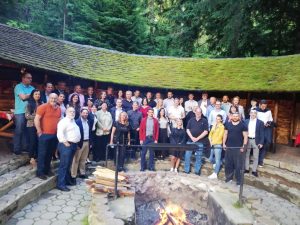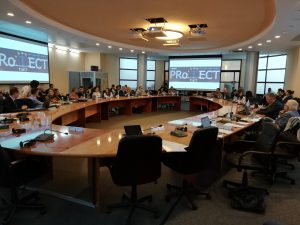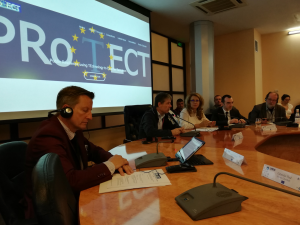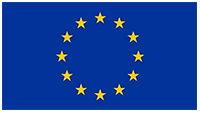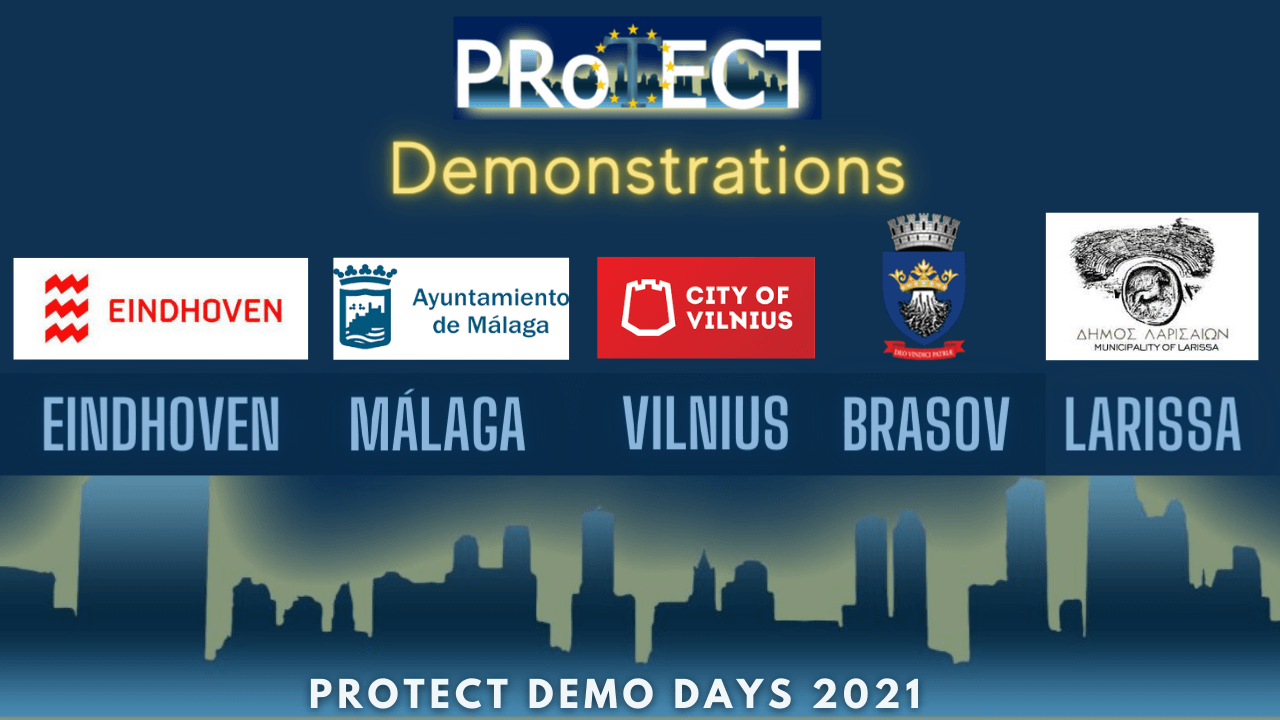PRoTECT Events

In order to create resilience against terrorism, local and regional authorities in Europe have taken a number of steps to prevent terrorist attacks and protect their citizens. By developing common guidelines and exchanging good practices the next step has been set to reaching sustainable and effective solutions. In correlation to these considerations, local authorities can play a significant role in improving the protection of public spaces.
By enhancing awareness on vulnerabilities within their own public space and through acquiring knowledge about existing solutions, both technological and human-centred, local and regional authorities are creating resilience against terrorist attacks. In order to promote the exchange of experiences, web conferences and seminars on the protection of public spaces and soft targets have been organized. The aim of these on- and offline sessions is to discuss and raise awareness of the role of local and regional authorities in the protection of public spaces, as well as to propose tools to prevent these types of risks.
Webinars
Panel: How far have we come in involving local and regional authorities in
the protection of public spaces?
After two and a half years, the PRoTECT project is coming to an end. During its implementation, despite the challenges imposed by the health crisis, the project has developed a number of tools that will help local authorities and other local actors to better prevent, respond and react to terrorist threats in public spaces. This final event has been divided into three sessions:
● The first session will be dedicated to an institutional discussion focusing on the cities’ progress in developing tools to prepare for and counter terrorist threats
● The second session will focus on sharing PRoTECT tools and their applications at the local level by local authorities.
● The third and final session will offer an opportunity to exchange tools and experiences between the different projects funded by the European Commission.

>>> Session 1- 14 June 2pm CET
Panel: How far have we come in involving local and regional authorities in the protection of public spaces?
Session 1 - Additional information
It seems that institutional efforts to strengthen the role of local and regional authorities have been consolidating in Europe and beyond. The European Commission is committed to reinforcing the involvement of local and regional authorities in the protection of public spaces. It promotes dialogue and exchange between national, regional and local authorities and supports the development of operational projects. This is also reflected in the EU Security Union Strategy (2020) and in its Counter-Terrorism Agenda for the EU. At the international level, the United Nations Office of Counter-Terrorism are implementing a Global Programme on countering terrorist threats against Vulnerable Targets which promotes a cooperative approach involving multilevel stakeholders. This panel will discuss key policy recommendations resulting from local, European and international institutions’ work to support relevant actors in the protection of public spaces. How prepared are cities to prevent, anticipate and react to terrorist threats? What needs to be improved to facilitate local authorities’ actions?
Speakers:
• Representative of the DG Home, European Commission
• Representative of the United Nations Office of Counter-Terrorism,
• Elizabeth Johnston, Executive Director, European Forum for Urban Security (Efus)
• Patrick Padding, Core group leader European Network of Law Enforcement Technology Services (ENLETS)
>>> Session 2- 15 June 2pm CET
Panel: What tools to improve local and regional authorities’ role in the protection of public spaces? The experience of the PRoTECT project
Session 2 - Additional information
Through intense research and practical exercises, the PRoTECT project has developed tools that facilitate cities' role in improving their security self-assessment for the identification of vulnerabilities. These tools also allow for the scanning of existing technological solutions for the identification and evaluation of possible responses against a given security problem in public spaces. This session will focus on those tools and how they have been tested by cities in specific public spaces. In a case study format, the experiences of city partners in the evaluation of solutions to protect their public spaces will be presented.
Speakers:
• PRoTECT Road Map, Giuseppe Cascavilla, PostDoc researcher at the Eindhoven University of Technology and Jheronimus Academy of Data Science
• Securipedia, Puck van den Brink, Researcher and consultant Public Safety and Security at TNO
• PRoTECT cases studies in technology solutions evaluation:
o The City of Brasov Case study
o The City of Eindhoven Case study
o The City of Malaga Case study
o The City of Larissa Case study
o The City of Vilnius Case study
>>> Session 3- 16 Jun 2pm CET
Panel: Exchanging experiences and other tools among projects on the protection of public spaces.
Session 3 - Additional Information
Since its inception, the PRoTECT project has sought to initiate and maintain a collaboration with other projects funded by the European Commission through the Internal Security Fund Programme (ISFP), as a way of building synergies and contributing to the sharing of experiences in order to improve local action but also to create collective knowledge. The aim of this session is to exchange tools and practices developed by similar projects. This will support urban security stakeholders in exploring the complementarity of the various different tools, and offer opportunities to explore means of maintaining a sustainable network beyond the PRoTECT project. Finally, the session is also intended to enhance cooperation between police authorities, academic partners and further institutional European networks on the protection of public spaces.
Invited projects:
• Protect Allied Cities against TErrorism in Securing Urban aReas (Pactesur ), City of Nice
• Simulation Training & Evaluation for the Protection of croWded public SpacEs
(Stepwise), CS Group
• Safer Space for Safer Cities (Safeci), Police of Berlin
• SECUR’CITIES, City of Lyon
• Centre for Research and Evidence on Security Threats (CREST), Huddersfield University
What is the role of local and regional authorities in the protection of public spaces and what tools can they use to better respond to terrorist threats?
A series of web conferences
In order to promote the exchange of experiences, Efus, in the framework of PRoTECT, is launching a series of web conferences on the protection of public spaces and soft targets. The aim of these online sessions is to discuss and raise awareness of the role of local and regional authorities in the protection of public spaces, as well as to propose tools to prevent these types of risks.
17 February 2021-2:00 pm CET, PRoTECT Web conference 1: Vulnerability assessment of a potential target : How can local authorities make informed decisions on the necessary security provisions for public spaces?
Web Conference 1 - Additional information
Assessing risks and vulnerabilities against a terrorist threat has become a necessary step in the security management cycle for actors in charge of security. Gaining better knowledge on site vulnerabilities can facilitate making informed decisions on the measures to adopt in order to offer safer public spaces.
This session will present the vulnerability assessment tool produced by the Protect project and the role of local and regional authorities. Who should be in charge of conducting a vulnerability assessment? Which actors need to be involved? What information is key to analyse and how to analyse it? What tools can facilitate the analysis? What challenges might arise for local security actors?
Speakers:
- Radoslaw Olszewski, DG HOME.
Terrorism and Radicalisation unit/Protection sector, European Commission.
EU Vulnerability Assessment Checklist for Public and Security Authorities developed by DG Home as part of the European Commission’s efforts to support Law Enforcement Agencies (LEAs) in the protection of public spaces. - Tatiana Morales/Pilar De La Torre, Programme Managers Efus.
The PRoTECT Vulnerability Assessment Manual to strengthen municipal staff’s ability by putting in place an overarching concept where tools, technology, training and field demonstrations lead to situational awareness and to an improvement of direct responses to protect public places before, during and after a terrorist threat. - Anita Schilling, Technical Project Leader at DIGINEXT.
Virtual Reality mock-ups of real-world spaces to facilitate the vulnerability assessment of public spaces – STEPWISE Project.
17 March 2021- 2:00 pm CET, PRoTECT Web conference 2: What considerations should cities take into account when considering the adoption of technologies to protect public spaces?
Web Conference 2 - Additional information
Given the current context of terrorist threat, cities are seeking to protect their public spaces by acquiring technological solutions, however, oftentimes they are confronted with an overwhelming market of technologies that proposes a significant number of solutions.
This session will discuss the challenges local authorities face when they acquire new technologies. How to evaluate technologies for the protection of public spaces? What are the needs of cities when choosing a technology? What information needs to be gathered about existing solutions in the market? What criteria for the evaluation need to be defined?
28 April 2021- 2:00 pm CET, PRoTECT Web conference 3: How can technology protect public spaces and soft urban targets?
Web Conference 3 - Additional Information
New technologies offer opportunities to better protect public spaces. These include ICT (for communicating, storing, analysing and protecting information), Sensors (for detection, identification, localisation, tracking), Actuators (for warning, intercepting, eliminating), Physical (for controlling access, impeding an attack, protective materials), etc.
This session will discuss the existing technologies as well as the opportunities and challenges that local authorities face when they decide to adopt them. What are the most widely used technologies for the protection of public spaces? What type of risks do these technologies address? What is the objective of these technologies (prevention, facilitating intervention, etc)?
The PRoTECT Consortium invited law enforcement agencies, local authorities, European-funded projects and the private sector to exchange best practices and technologies in a series of three PRoTECT webinars, hosted on 15, 15 and 17 July 2020. You will find audio and visual recordings, along with closed captioning, below.
To directly view the solutions that have been selected from the Request of Information, click here.
Session 1 (15 July, 10am CEST) Panel: The protection of public spaces at policy and strategy level
Additional information on the first webinar.
The EU Action Plan and the working document on Good Practices to Support the Protection of Public Spaces state that the co-production of public space protection is key, particularly in the context of terrorism. Preventing and mitigating terrorist threats require raising awareness among local and regional authorities and training them. Furthermore, it is important they cooperate with each other as well as with the private sector. Increased cooperation is also needed between the local, regional and national levels of governance. What avenues for cooperation exist at the European level regarding the protection of public spaces? How can cities best access funds and training? How can we support peer to peer exchanges among EU cities? How to make such coordination and cooperation effective? What are the challenges for the different actors in operationalising a joint action?
Session 2 (16 July, 10am CEST) Case studies: The protection of public spaces at practitioner level
Additional information on the second webinar.
“There is no one single solution available, conversely, multiple methods and techniques can be put in place to guarantee safety and security in public spaces. The techniques range from architectural design in order to rethink the design of public spaces keeping security into account in continuity to emerging technologies such as AI and predictive surveillance. Moreover, whenever new technologies could appear to be expensive in cost and questionable regarding privacy, or when it could be difficult to rethink and re-project public spaces, building an action plan in order to mitigate, prevent and manage crime events would be a viable solution" (PRoTECT Best Practices and Technologies).
This session presented an overview of the PRoTECT best practices and case studies implemented by cities for the protection of public spaces.
Session 3 (17 July, 10am CEST): The PRoTECT project’s perspective on the protection of public spaces
Addition Information on the third webinar.
Devising hypothetical threat scenarios in specific public spaces that are potential soft targets for a terrorist attack can greatly help municipalities assess existing solutions to prevent or mitigate such attacks. The European Union’s Technology Evaluation Framework (TEF) is a unique tool for evaluating such solutions and/or technologies, which local authorities can tailor to their specific needs and vulnerabilities. During this session, the Request for Information procedure to identify potential solutions to be demonstrated in the five PRoTECT partner cities was presented, along with the use and application of the TEF, and the technological solutions selected by municipalities.
Seminars
First seminar
First seminar in Brasov, Romania on 17 July 2019.
